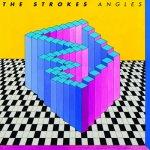
The Strokes Angles
(RCA)
I had a conversation a few weeks ago about the Strokes that just stuck in my head. Asked what he expected from their fourth record, a friend answered “It will be great, yeah, it will.” Really? How do you know that? My critical hackles rose in anticipation “I just don’t think they can make a bad record, you know, like Beethoven, I just don’t think they can!” Admittedly I’m not capable of commenting on the works of Beethoven, but pop bands throughout history have so often been proved fallible; in a world of deadlines, labels and publicity any band can be forced into releasing an undesirable product. Indeed, I worried that this record might be just that, and then I wondered, parroting that buzz-phrase that encircled the staggering banking sector not so long ago: ‘Are the Strokes too big to fail?’ What happens if such a definitive band collapses beneath the cruel shackles of a generation’s expectation?
Scary, but let’s not get bogged down with anecdotes and my own vain frustrations. Fortunately Angles is not a bad record – making it the sort of incidental evidence that pisses all over my opening premise. More than that, however, it is a very brave record; I might even go on to say it’s the album that the band had to make. Why? Because right about now the ardent zeal of the American garage rock band that so commanded the early part of the last decade is waning. And as the White Stripes call it a day, these guys are still here; now their generous legacy all but emptied. So it shouldn’t come as any surprise that Angles is not Is This It mark II (or mark III if you include their second record). It’s a far more colourful and disparate experience, richer in its guitars and broader in influences; that sounds tantalising already… eh?
Macchu Pichu opens Angles brimmed with cool assurance. Built upon a riff both simultaneously bouncing and serrated it roars through, thrusting forth lines like “I’m just trying to find / A mountain I can climb” in unmeasured triumph. It’s a heady mixture of what we heard on Is This It and First Impressions Of Earth, poppy but in that well tread vein of form that grew out of the former. With the tone now set Under Cover of Darkness follows suit – but with that sharpened sense of depth disposed of - it’s a pretty thing but it makes for an all too forgettable four minutes. However, by invoking 50s rock and roll sounds and those sparkling, lithe guitars these four minutes hint at what is to come.
And the pace continues unabated: Two Kinds Of Happiness glides through the reggae slur of its intro, like some enamouring Joe Strummer tribute, before suddenly crashing headlong through flickering glam-rock guitars, disjointed vocals and extensive offbeat rhythms. More than anything it becomes the album’s reveal as its layered complexities parade through.
It’s potential single Taken For A Fool that finally does the job of tying down these whipping loose ends; fuzzed vocals and shifting, waltzing guitars are complemented by a potent blend of clipped vocals, estranged balladry and that Strokesian cool. They don’t really do slow, but Call Me Back is as close as we’ll get. It’s wonderfully morose and detached as with hazy intonation Casablancas wonders why “When I look to you / You look away”. Nonetheless by Gratisfaction they’re back, set against ticking drumkits and lusciously healthy guitars as it lurches through. Here ordering becomes an issue, as the alien sounds jar through the halting transitions, leaving the last few tracks feeling stranded and underwhelming.
Closer Life Is Simple In The Moonlight is one of the best results of their experimental forays. The vocals push it forward within instrumentals that – barring a deftly inserted guitar solo – root the track in the style that The Strokes do so undoubtedly well. I have to say that I prefer them this way. It makes finer use of one of Casablancas great gifts to develop songs, to shift tone and urgency with leisurely control, but on Angles this, one of the Strokes most prized talents, works too often towards wasted and unnatural ends.
The Strokes have managed to culture a great sense of the schizophrenic on Angles, mapping polar tones in tandem to produce a record that feels both confused and entirely deliberate. The angular guitar sections hold far more heritage in common with the likes of Bloc Party and Maxïmo Park, and yet in many places it works. This makes for an uneasy marriage with the remnants of their more traditional style, and for every intersecting success there’s an entangled mess to go with it. Such, it deserves to be said, is the nature of the beast with experimentation; better The Strokes develop like this than succumb to a formula that, once iconic, may just be starting to stale. And that, I assure you, is a very happy note with which to conclude.
21 March, 2011 - 15:57 — Joe Iliff